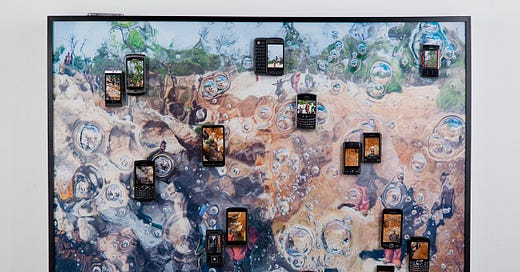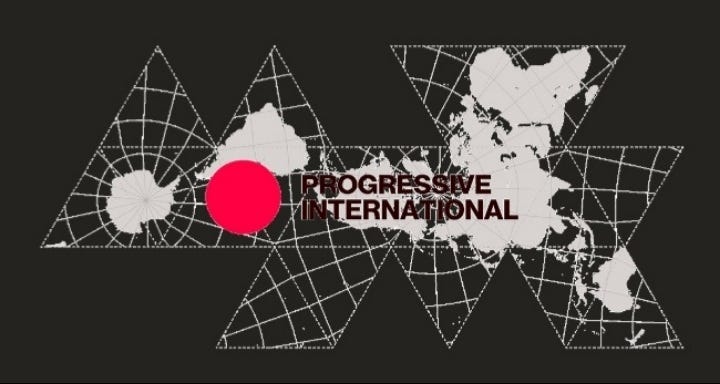Art of the Week: Katanga Bub, Anne de Vries,
More than 200 movements, unions, and political parties from around the world have united to condemn the continuing imperialist violence against the people of Congo in a statement organised by the Progressive International. The groups, who range from Abahlali base Mjondolo in South Africa to the Kuwaiti Progressive Movement to India’s National Alliance of Peoples Movements, have come together to stand in solidarity with the demands of the Congolese people for dignity, sovereignty, and liberation.
The statement follows recent advances by the M23 militia and Rwandan soldiers in the North and South Kivu provinces of the Democratic Republic of Congo. According to United Nations (UN) experts, the Rwandan army is in "de facto control of M23 operations". Rwanda is a proxy for Western interests in the mineral-rich Great Lakes region. Its military is armed by the United States, United Kingdom, France, the European Union, and supported by other proxies like Uganda. It is closely aligned to Israel and its intelligence and military are equipped with Israeli-made spyware and weapons. Paul Kagame, Rwanda’s president, remains a key ally of the West even as his regime surveils, jails, tortures, disappears and assassinates critics; seize sovereign territory; and violates the most fundamental norms of international law.
The UN has reported that more than 400,000 people have been forced to flee their homes since the start of the year, adding to the seven million who are already displaced. This is a humanitarian crisis beyond measure.
From Kinshasa to Bukavu, tens of thousands of people have taken to the streets to oppose the incursion, call for an end to the violence, and voice their anger at the imperial powers that sit at its root. Western embassies have been targeted by protestors for their support of Rwanda and its military.
The Congo is one of the world’s wealthiest countries. It is abundant not only in natural resources. From beryl to bauxite, copper to cadmium, gold to germanium, manganese to monazite, Congo holds trillions of dollars in metals and minerals. It produces over 70% of the world's cobalt, a mineral indispensable to the global tech economy.
It is also rich in land. Over 80 million hectares of Congolese land — plateaus, savannas, grasslands, and mountainous terraces — are arable. Its forests are among the lushest in Africa. Its rivers, lakes, swamps, and ocean waters contain vast reserves of fish — and its hydroelectric capacity counts for as much as an eighth of the world total.
This fabulous wealth has long drawn the world's parasites and plunderers.
Belgium's King Leopold II, hungry for rubber and ivory, seized the country as his personal possession in 1885. In the holocaust that followed, 10 million Congolese people were killed in one of many prologues to the genocidal violence that would later engulf Europe.
The United States would soon pick up the mantle. The CIA-backed assassination of Patrice Lumumba in 1961 cemented Western control over the country, installing the kleptocrat Mobutu Sese Seko and ensuring unlimited access to the Congo's wealth for Western corporations.
Today, beneath the polished surfaces of our phones and electric cars lies a chain of suffering that stretches from the toxic pits of the Congo, sometimes worked by children labouring at gunpoint, to the boardrooms of Silicon Valley where minerals like cobalt and coltan, ripped out of the Congo, are plugged into the “green economy”. At the same time, nearly three in four Congolese people live in extreme poverty.
The Mandé Charter, adopted in what is now Mali in 1222, opens by proclaiming that "every human life is a life". But to the imperialist nations, Congolese life, African life, is expendable. The five million people who died in the wars after Mobutu's fall were barely acknowledged in the Western media. And when this catastrophe was mentioned, it was, in high colonial fashion, dismissed as a result of “tribalism”.
Today, as Rwandan forces invade the Congo to appropriate and funnel minerals to Western economies, we encounter the same shroud of silence. Even when the crisis is given cursory acknowledgement, it is attributed to “regional instability” — a nebulous and passive category that transmutes the systemic into the innate, obscuring the role of imperialist accumulation as it destroys African land and truncates its peoples’ lives.
That is why we, popular movements, political parties, and unions from around the world, stand with the people of Congo in their pursuit of dignity, sovereignty, and liberation — and vow to block the arteries of imperial plunder wherever we confront them. Rwanda must be isolated and opposed in the same way that Israel must be isolated and opposed. Then, their imperialist backers, who underwrite the violence, must be forced to retreat.
In solidarity,
The Progressive International Secretariat




